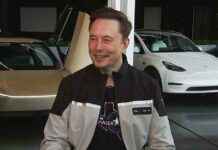Tesla’s Market Cap Plummets Below $1 Trillion Amid 8% Stock Drop
Elon Musk, the visionary CEO of Tesla Inc., found himself at the epicenter of a financial storm as the electric vehicle giant’s market cap dipped below $1 trillion. The sharp decline, a staggering 8% drop, marked the company’s lowest valuation since November 7, shortly after President Donald Trump’s election victory.
This recent downturn comes on the heels of a tumultuous year for Tesla, with shares plummeting 25% since the start of 2025. In stark contrast, the Nasdaq has only seen a slight 1.5% decline, highlighting the unique challenges facing Tesla in the current market climate. The company’s stock has also tumbled over 35% from its record high on December 16, reflecting broader concerns within the industry.
Despite these setbacks, Elon Musk remains the world’s wealthiest individual, with a net worth exceeding $380 billion. However, the tech mogul has seen over $100 billion evaporate from his personal fortune in recent months, underscoring the volatile nature of the market.
The latest blow to Tesla’s stock came after a damning report from Reuters revealed that the company’s long-awaited upgrade to its semi-automated driving systems had failed to meet consumer expectations. Owners in China expressed disappointment with the “navigate on city streets” feature, which fell short of Musk’s ambitious promises for autonomous driving technology.
Challenges in China
This revelation only added to the mounting pressure on Tesla, particularly in China, where competitors like BYD offer similar features at a lower cost or even for free. Xiaomi, another major player in the market, includes comparable technology as a standard option on its popular SU7 model, further intensifying the competition.
The lackluster performance of Tesla’s automated driving systems has left shareholders on edge, with concerns ranging from the company’s overall trajectory to Musk’s increasingly political ventures in Washington, D.C. As the CEO spearheads the so-called Department of Government Efficiency under President Trump’s administration, questions surrounding regulatory oversight and corporate governance have come to the forefront.
Musk’s controversial political activism has sparked backlash in various markets, leading to protests at Tesla stores and service centers. Moreover, the recent announcement of extensive tariffs on goods from Canada, Mexico, and China by the Trump administration has further fueled uncertainty surrounding Tesla’s future prospects.
Financial Woes and Market Turbulence
In light of these challenges, Tesla’s financial performance in the fourth quarter of 2024 fell short of analysts’ expectations, with earnings and sales missing the mark. Automotive revenue saw an 8% decline from the previous year, while operating income plummeted by 23%, reflecting a broader trend of economic uncertainty within the industry.
The reduction in average selling prices across Tesla’s lineup of vehicles, including the Model 3, Model Y, Model S, and Model X, played a significant role in the company’s lackluster results. This pricing pressure, coupled with declining sales in key markets like California, has raised concerns about Tesla’s ability to maintain its competitive edge in the rapidly evolving electric vehicle landscape.
Despite these setbacks, Tesla shares remain relatively stable, hovering around 20% above pre-election levels. Much of this resilience can be attributed to a post-election rally that saw a 15% surge in the stock price, driven in part by Musk’s support for Trump’s presidential campaign.
As the industry grapples with shifting dynamics and regulatory challenges, Tesla’s future hangs in the balance. The coming months will be crucial for the company as it navigates a rapidly changing market landscape and strives to regain investor confidence in its vision for sustainable transportation.
Musk and Tesla have yet to comment on the recent developments, leaving shareholders and industry observers to speculate on the path forward for one of the world’s most innovative companies.

























